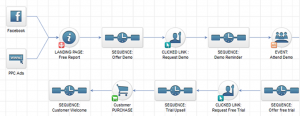
Sometimes, things just don’t work out. If you’ve ever been single for an extended period of time, this is a mantra you’ve learned to embrace. But when things don’t work out in the work place, it can feel traumatic. Many recruiters live in fear of the bad hire. Firing employees often has a ripple effect throughout the company where other employees become fearful for their jobs. Some even start looking on the job market, sure they’re the next person out the door. But the bad hire is also a cost center for the company. It costs a lot of money to advertise open jobs, to fill a position, and train the employee to do their job. In fact, the U.S. Dept. of Labor estimates a bad hire costs approximately 30% of their yearly salary if things didn’t work out in the first year. So how do you prevent a bad hire? Try to avoid making the following recruiting mistakes:
- Overlooking soft skills. It’s important that employees be good at their job. If you hire a systems engineer, you want someone who will be able to do the job. But you also want to find a person who is good at communication and can get along well with others. If you hire solely for their skill set, you may end up hiring a team of jerks who can’t get along with anyone. Your company culture could slide and you could lose some of your best talent. It’s important to look for soft skills as well in the hiring process. If your recruiting process forgets to include these important skills, you could be headed towards a bad hire.
- Not following up on references. I have one friend who is a recruiter and in her 20 year career, she’s never once followed up on references or checked into a candidate’s employment record. What she could be missing out on are some glaring red flags. 4 out of 10 employees admit to blatantly lying on their resumes. What could you be missing? It’s worth putting in the extra time to call an employee’s references as well as contacting their old companies to see if they’d be eligible for rehire. These kinds of calls can provide a more nuanced view of the candidate that may predict whether they’ll turn out to be a bad hire at your organization. While new ban the box rules preclude background checks in many states prior to a conditional offer, it is still a smart practice to look into a candidate’s previous employment record.
- Keeping the interview too surface. In the interview, the hiring manager really wants to dig deeper into a candidate’s resume. This is their shot to ask how they made decisions, what their work style is like, and how they deal with pressure. These kinds of questions can go a long way towards indicating whether or not they’d be a good hire or a bad hire. It’s worth it to take a deeper look into how the candidate may work with others.
- Failing to explain the job further. Some employees are only bad hires because they didn’t know what was expected of them. Had they known in the interview they were expected to make a year’s salary their first month, they likely wouldn’t have taken the job. It’s important for interviewers to explain the job in greater detail to set the candidate up for success. Failing to explain things like dual duties in sales and IT might also catch an employee by surprise who was unaware they’d be spread a little thin. Take the time to explain exactly what your company expects and you can enhance your chances of making a good hire.
- Requiring candidates to be too much of a generalist. Nobody can do everything. In fact, this is why we specialize; specialization allows people to accomplish what they’re good at and leave the rest to someone who has more skills in that area. By requiring someone to be too much of a generalist, a company runs the risk of recruiting someone who is merely mediocre at all of it. Make a list of what’s really important to you in that position and find your specialist.
By adjusting your hiring process, you too can ensure you make better hiring decisions. While you may not be able to prevent a bad hire 100% of the time, you can certainly make large strides towards minimizing the chance of a bad hire getting through.
Business & Finance Articles on Business 2 Community(121)








